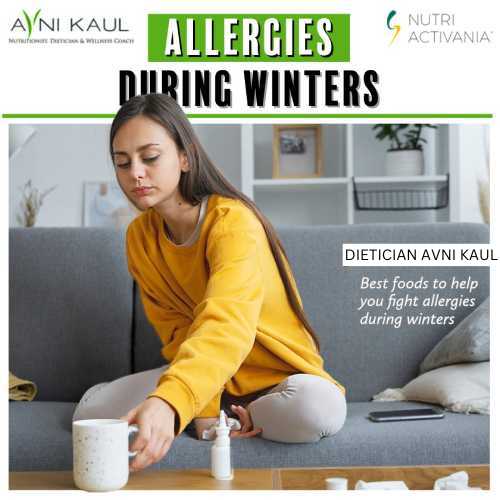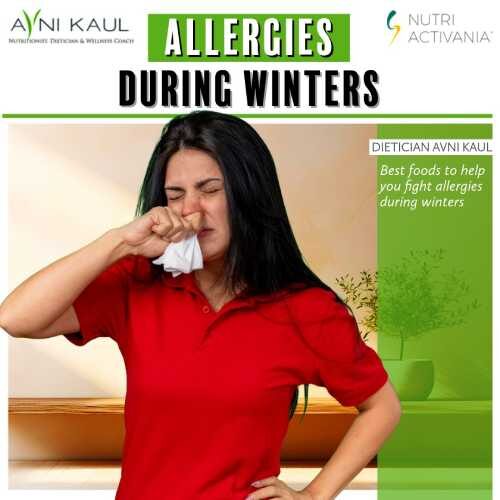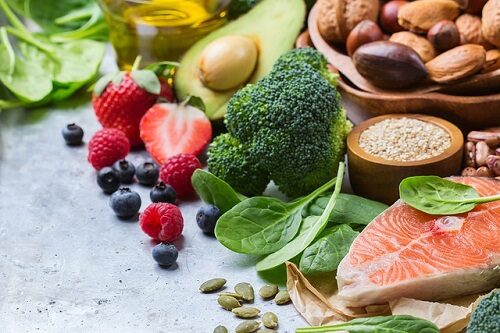Winter, with its enchanting snowscapes and delightful culinary offerings, is a season cherished by many. However, alongside the cozy moments and hearty meals, it brings a familiar foe – winter allergies. As the temperature drops, so does our immune system’s resilience. The cold weather keeps us indoors mostly locked up with our allergens. Dander from pets, dust mites in bedding and furniture, mold spores in damp areas, and cockroach droppings are some of the commonly found winter allergens. While over-the-counter medications offer relief, incorporating specific foods into your diet can alleviate symptoms like runny noses and watery eyes. From anti-inflammatory properties to immune system support, various dietary choices can help ease the discomfort of winter allergies.
Which winter foods will help you prevent allergies?
Leading Dietician in Delhi, Avni Kaul, suggests adding these foods to stay away from winter allergies:
Local Honey
Consuming local honey regularly may help build immunity to pollen, alleviating allergy symptoms. The theory suggests that small amounts expose the body to manageable allergens. Raw honey’s antibacterial, antiviral, antifungal, and anti-inflammatory properties can ease respiratory complaints, reducing cough intensity. Add two tablespoons of honey and lemon juice to your cup of tea every morning for added antioxidant benefits. Local unprocessed honey contains small amounts of local pollen, potentially priming the immune system for high-pollen months, though research is limited. Switching to local honey is harmless for honey lovers, but effectiveness varies based on pollen types.
Quercetin-rich Foods
Quercetin, a potent natural antioxidant, aids in combating allergies by stabilizing histamine-releasing cells. Onions, apples, and berries are quercetin-rich foods, promoting a calmer immune response. Berries, particularly dark varieties, not only boast antioxidants but also aid DAO synthesis, regulating histamine levels. Red onions, with their deep colour, offer a high quercetin concentration, acting as a powerful natural antihistamine. Incorporating these foods into your diet can alleviate symptoms like watery eyes and an itchy throat.
Vitamin C-rich Fruits
Citrus fruits like oranges, grapefruits, lemons, and limes are rich in vitamin C. While it won’t prevent colds, it may shorten their duration and benefit allergy sufferers. Vitamin C decreases allergic rhinitis by reducing histamine release and breaking it down faster. This helps alleviate discomfort during allergic responses. Additionally, vitamin C’s antioxidant properties counteract inflammation caused by free radicals, providing relief from allergy symptoms. Include oranges, strawberries, apples, and watermelon in your diet for these benefits.

Pineapple
The anti-inflammatory properties of an enzyme called bromelain present in pineapple not only reduces mucus but also tackles nasal congestion, offering relief from allergies. Savour it fresh or blend into smoothies for a tropical treat that brings both flavour and health benefits.
Probiotics
Probiotics, crucial during pregnancy and breastfeeding, offer proven anti-inflammatory and anti-allergic benefits. Enhancing gut health through probiotic-rich foods like yoghurt, kefir, and sauerkraut fosters beneficial bacteria growth. This balanced microbiome may reduce allergic reactions. Incorporating these foods into your diet acts as a tasty defense against allergies. Combating the common cold and flu, probiotics in yoghurt promote overall health, faster recovery, and less severe symptoms compared to those lacking probiotics.
Salmon
Finally, some good news for fish lovers. Evidence suggests that omega-3 fatty acids in fish, particularly EPA, can enhance allergy resistance and alleviate asthma symptoms. Studies link higher EPA levels in the bloodstream to reduced allergic sensitivity and hay fever risk. Recent research indicates omega-3s’ anti-inflammatory properties may ease airway narrowing in asthma and seasonal allergies. Embrace fish for potential respiratory and allergy relief. Grilled or baked salmon is not only delicious but also a nutritious addition to your winter menu.
Leafy Greens
Boost your immune system with nutrient-rich leafy greens like kale, spinach, and Swiss chard. Packed with vitamins and antioxidants, they strengthen overall health. Incorporate them into soups, salads, or smoothies for a defense against winter allergies. Dark, leafy greens such as spinach and kale are nutritional powerhouses linked to a lower risk of allergic rhinitis. Include a variety in salads, smoothies, or cooked dishes for well-being and potential allergy relief. Toss greens into your daily salad to combat winter allergies.
Turmeric
The most commonly used ingredient in our daily kitchen, contains curcumin, a compound renowned for its anti-inflammatory and antioxidant properties. Try adding a pinch of turmeric to your soups, stews, or even a cozy cup of turmeric-infused milk to stay away from the swelling.
Incorporating local honey, quercetin-rich foods, vitamin C fruits, pineapple, probiotics, salmon, leafy greens, and turmeric into your winter diet may offer a delicious and natural defense against allergies. Embrace these nutrient-packed choices for a healthier and symptom-free season.




